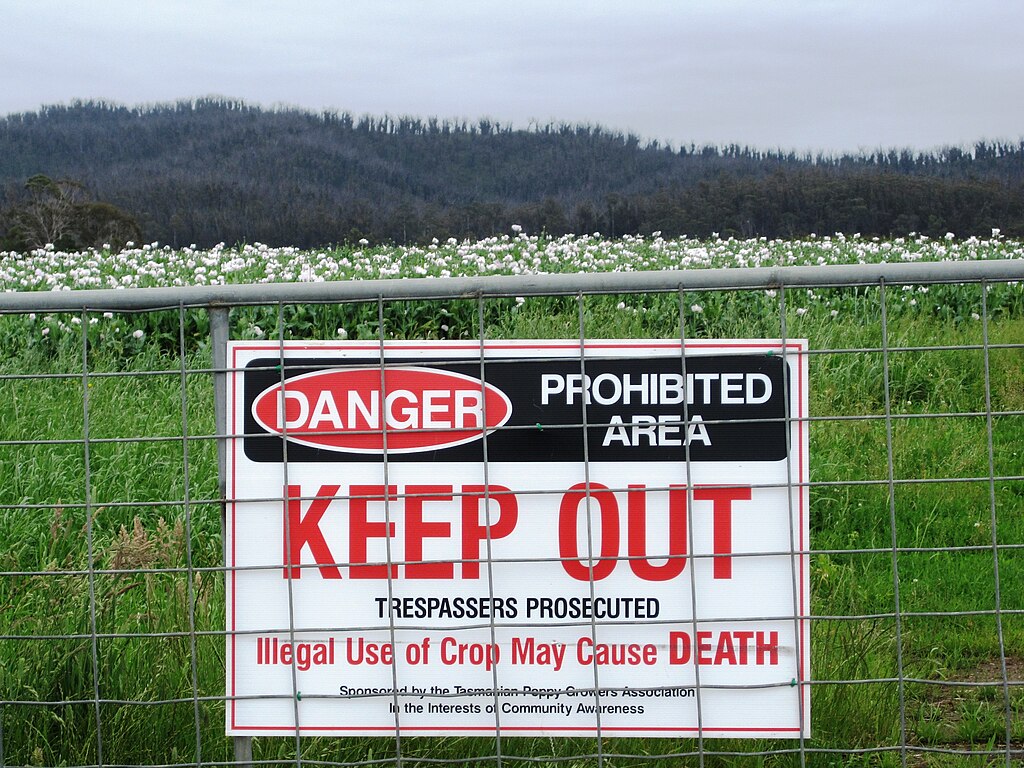 |
| See the included news story below regarding the death of trespassers thinking they could “get high” from the unprocessed from poppy/opium capsules. |
Recently, when we drove through the countryside outside of Penguin, we stumbled upon a number of fields of flowers in full bloom. Unsure as to the type of flowers, we both speculated they could be poppies, which was confirmed when we encountered the above sign.
From this site:
“The Tasmanian opium poppy farming industry was established in Tasmania in 1966. Farms in Tasmania produce about 50% of the world’s legal poppy straw that is later refined into opiates such as morphine and codeine.”
Tasmanian Alkaloids is Tasmania’s largest corporate grower of opium poppies.
 |
| At first, when we saw the pretty flowers, it didn’t dawn on us that they were poppies. Once we noticed the warning sign it all made sense. |
We gasped in surprise, curious as to the history of the poppy crop in Tasmania. In speaking with Terry, our friend and landlord, who’s lived in this area all of his life, he explained that Tasmania’s remote location has made it a good location to grow this dangerous crop.
Over the years, many foolhardy travelers have attempted to take advantage of the poppy fields by stealing the opium poppy capsules as shown in the photo included here today. This has resulted in a number of deaths as described in this article:
“Deadly opium poppy capsule thefts increasing in Tasmania
To most, the poppy is a pretty garden flower, but in Tasmania, opium poppies that are refined into medicines such as morphine and codeine are a major agricultural crop, with the island state supplying half the global stocks. It’s an eye-catching and lucrative crop but tightly controlled because the plant’s capsules can be deadly if ingested.
Stolen poppy capsules have caused the death of several people in the last decade, most recently a Hobart teenager who overdosed in 2012 after brewing a tea of poppy heads.
The Tasmanian Justice Department’s annual report reveals capsule thefts are creeping up. A total of 516 capsules were stolen in 2015-16, up from 331 the year before, although far below the 3,923 capsules stolen in 2013-14. Chief executive of Poppy Growers Tasmania, Keith Rice, said some losses classified as thefts could be attributed to snap-happy tourists.”
 |
| Close up of the opium poppy capsule contains the valuable alkaloid content used to make painkillers. (Not our photo). |
The cost for thieves to travel to Tasmania to steal the capsules is prohibitive and getting them out of the Australian state would be difficult, if not impossible. When we arrived at the airport in Hobart, security was intense with dogs sniffing for drugs.
As indicated above, some thefts of the capsules are perpetrated by local teens and youth hoping for a free and easy high which ultimately proved to be fatal in many cases.
 |
| When we drove through the countryside, we encountered several fields of poppy farming used for medicinal purposes. |
As for the crop itself, please click here for a detailed story as to how the poppy/opium crop production has changed over the years, seriously impacting poppy farmers in the state: “Rising stocks, declining demand, and more productive poppy crops are causing Tasmania’s poppy growers a world of pain.”
Tasmania never ceases to amaze us. We continue to learn from its people, its agribusiness, its vast expanse of awe inspiring scenery, and its ability to maintain a long-ago culture of rural living and authenticity rarely found anywhere else in the world.
 |
| We had no idea poppy farming was big in Tasmania until we saw the poppy paddocks in the country. |
After a busy day out yesterday, details of which we’ll share tomorrow, we’re staying in today. We’re preparing a special meal (for no special reason) which got me up chopping and dicing early this morning. Clothes are drying on the clothesline and if the sun peeks out, we may venture out on a walk.
Have a great day
Photo from one year ago today, January 4, 2016:
 |
| The vegetable stand where we purchased most of our produce during our 28 days stay in Pacific Harbour, Fiji. For more details, including the total expenses for the four-month total stay in Fiji, please click here. |
